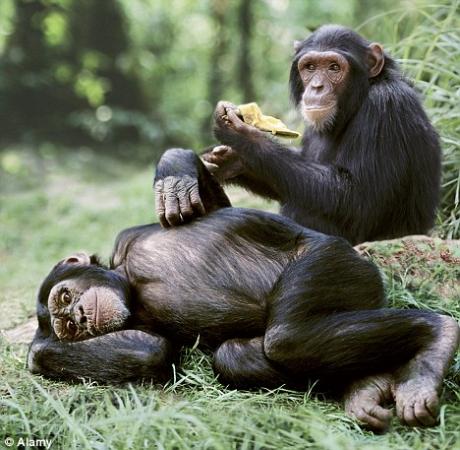研究发现与人类亲缘关系近的黑猩猩具有无私和仁爱的美德。
这一发现显然推翻之前的假设—真正的利他主义是人类独有的特征。

黑猩猩具有无私和仁爱的美德
之前的研究认为黑猩猩本质上自私的,当受到威逼或欺骗的情况下,它们才表现出慷慨的行为。
如今,科学家认为这些研究是错误的,最新研究有力地证明我们最亲的动物具有自发的无私行为。

黑猩猩对个体施舍方面表现很敏感
黑猩猩对个体施舍方面表现很敏感,在群体中,那些不断索要的黑猩猩往往什么都得不到。
发表在National Academy of Sciences科学学报的结论从野外黑猩猩的观察中得到支持。
在自然栖息地,黑猩猩懂得互相帮助和表现怜悯之情,如鼓励群体中哀伤的成员。然而,直到如今,这些特征还没有在实验条件下得到证实。
有人怀疑之前的研究太过复杂,对心理因素没有考虑充分。在新的实验中,为7个雌性成年黑猩猩提供2种相似行为的选择,一种行为奖励首席演员和合作伙伴;另一种行为只奖励演员。
在一系列的实验中,“演员”猴子从箱子中选择不同颜色的令牌。
一种颜色的令牌可以换取黑猩猩的共享香蕉,另外一种颜色的令牌选取后只能给个体奖励。
所有的7只黑猩猩对“慷慨”的选项表现出支配性的倾向。
研究人员称,利他主义不是人类的专利。
接下来,科学家计划研究黑猩猩的无私行为是否关联到社会活动,如社会供应的食物交换。(生物探索译 Pobee)
生物探索推荐英文原文
Mankind isn't the only altruistic species... chimps have a heart too
Chimpanzees can be as selfless and charitable as kinder examples of their human cousins, a study has found.
The findings appear to overturn previous assumptions that true altruism is a uniquely human trait.
Previous research had suggested that chimps are inherently selfish, and only display acts of generosity when pressured or tricked into doing so.
Scientists now say those studies were flawed. The new research strongly indicates that our closest animal relatives are capable of spontaneous unselfish acts.
Chimps also appear sensitive to whether or not an individual deserves a handout. Among chimps, as with humans, those who ask too persistently do not get.
The results published today in the journal Proceedings of the National Academy of Sciences are supported by observations of wild chimpanzees.
In their natural habitat, chimps are known to help each other and show evidence of empathy, such as reassuring distressed members of their group.
However such traits have not been verified under experimental conditions, until now.
A U.S. team at the world famous Yerkes National Primate Research Centre at Emory University, Atlanta, set about designing a simple and straightforward test of chimp charity.
It was suspected that previous studies had been too complex and not taken sufficient account of psychological factors.
In the new experiment, seven adult female chimps were offered a choice between two similar actions. One action rewarded both the lead participant, or 'actor', and a partner. The other rewarded only the actor.
A series of trials were conducted in which 'actors' chose between different coloured tokens from a bin.
One coloured token could be exchanged with an experimenter for edible treats, pieces of banana, for both members of a pair. The other, selfish, option was to choose a colour that only yielded a personal reward.
All seven chimps showed an overwhelming preference for 'prosocial', or generous, choice.
It made no significant difference whether or not 'actors' and 'partners' were related. But partners hoping for a share-out were less likely to get anything if they made a fuss, begged or spat water at those exchanging the tokens.
'We were excited to find female after female chose the option that gave both her and her partner food,' said study leader Dr Victoria Horner.
'It was also interesting that being overly persistent did not go down well with the choosers. It was far more productive for partners to be calm and remind the choosers they were there from time to time.'
During the experiment, 'actors' were presented with a bucket containing 30 tokens randomly jumbled together.
Tokens were split into two colours, one of which could be exchanged for a shared reward, and the other for a 'selfish' reward. Purple/green, red/blue and yellow/black pairs of tokens were used in the tests.
Rewards were wrapped in paper to reduce the probability of actors being distracted by visible food. Unwrapping the treats also produced a loud noise, so that actors could both see and hear when a partner received a reward.
The findings suggest that genuine altruism is not confined to humans, say the researchers.
Next, the scientists plan to investigate whether the apparent unselfish behaviour of chimps is related to social interactions, such as swapping food for social support.
Read more: https://www.dailymail.co.uk/sciencetech/article-2023800/Mankind-isnt-altruistic-species--chimps-heart-too.html#ixzz1UVL9NqSN







